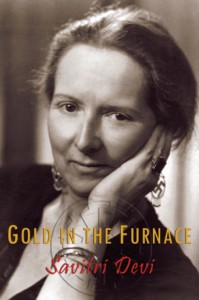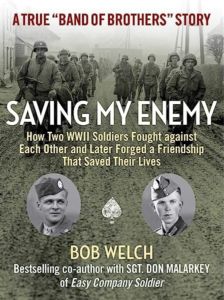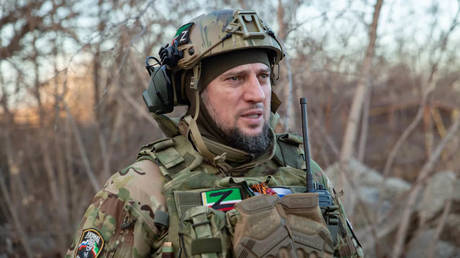The Rare War Story With a Happy Ending
Bob Welch
Saving My Enemy
Washington, DC: Regnery History, 2021
Watching Time Team’s Digging Band of Brothers recently reminded me that I really needed to get a move on with my review of Saving My Enemy.
I have a soft spot for this book. I’ve written about it on Amazon and on both my blogs. I’ve told family and friends about it — which is odd, given that I’ve never been a fan of Band of Brothers. I completely missed the series when it originally aired originally, I didn’t finish it when I watched it after reading the book, and I gave the book “only” four stars out of five — which had interesting consequences. So why am I still writing about it two years later? Simple: It is a good story with an important message.
In 2021, long after the initial hype about Band of Brothers had faded, a new book with an Easy Company theme was released: Saving My Enemy by Bob Welch. Welch had worked with Band of Brothers veteran Don Malarkey on his 2008 book Easy Company Soldier. In one of their work sessions, Malarkey unexpectedly mentioned that he had befriended a German soldier after the war. Welch, anxious to meet their deadline, didn’t pay attention. It was only after Don Malarkey’s death in 2017 that his daughter contacted Welch with a proposal for a new book: The story of how her father had befriended a former German soldier long after the war, how this friendship had helped both men cope with their post-traumatic stress disorder, and how this friendship had now extended into the next generation.
When I saw the announcement on Valor Studio‘s website, I knew I would pre-order the book. Because of paper supply issues at the time, it took forever for the print version to be produced. In the meantime, I read the e-book and wrote a review that, in retrospect, was perhaps not as concise as it should have been. But because of that, I was contacted by one of the sons of the German soldier whom I had just read about. After some initial polite criticism of my criticism, we settled into a quite amiable correspondence during which I learned more about the background of both the book-writing process and the story itself. It was lovely. Saving My Enemy has therefore become rather special to me — even though I still stand by my four stars rating.
Don Malarkey and Fritz Engelbert grew up very differently, and not just because they lived on opposite sides of the Atlantic. Don Malarkey was outgoing, fun-loving, and always getting into trouble. Fritz Engelbert was reserved, an introvert, a boy of the generation that almost considered Adolf Hitler a god. When he was old enough, he wanted to join the Waffen-SS, but his father refused to give permission. Fritz thus had to settle for the Wehrmacht, a decision that brought him and Don Malarkey into five miles of each other when both men fought in the Battle of the Bulge.
Bob Welch gives a vivid description of two situations in which Malarkey and Engelbert, both on their own, come across a dead enemy soldier: Malarkey realizes that he had just shot a 16-year-old sniper, while Engelbert finds a dead American soldier out in the snow, eyelashes white with frost. I think it is those scenes that stick in my memory the most.
After the war and, in Engelbert’s case, French captivity, both men settle into civilian life. They get jobs, marry, have children. But the war never leaves them. Each man in his own way tries to deal with what we now know as post-traumatic stress disorder, and which takes different shapes corresponding to each man’s personality. Malarkey seeks refuge in alcohol, Engelbert in work. At odd moments, tempers erupt over seemingly trivial things. Both men contemplate suicide. Engelbert becomes a self-hating German, agonizing over what he perceives as his complicity in an evil regime.
It takes both men decades to open up to their families about their experiences in the war. For Malarkey, the catalyst is mainly Stephen Ambrose’s book Band of Brothers and the HBO series based on it that catapult him to celebrity status. For Engelbert, it is not as straightforward. It starts with a trip to France and Belgium in 1971. Years later, after his retirement, he familiarizes himself with the Internet and becomes active in war-related forums. After some initial reluctance, he agrees to be interviewed on camera in and around Bastogne by a Belgian documentary filmmaker and, despite his fears, he receives a warm welcome from the local community.
When in 2004 Billy Maloney, a Sergeant 1st Class stationed in Germany, proposes a visit from Easy Company veterans to raise the morale of active US troops, he also suggests inviting some German veterans. Fritz Engelbert makes the list.
Welch arranged his book in such a way that, while each chapter is split into Malarkey and Engelbert’s sides of the story, both men’s events and experiences mirror each other. It’s excellently done and, of course, has the reader waiting for the moment when both threads finally intertwine. It’s worth the wait.
Both men hit it off almost immediately. On the second night, they cry together over beer, confessing all the stored-up pain and guilt they have felt for decades — and they talk each other out of it. From then on, things really change. Fritz in particular becomes a new man, able to hold his head high and accept the good with the bad. Both men and their families meet a few times over the years until infirmity and, ultimately, death put an end to it.

You can buy Savitri Devi’s book, Gold in the Furnace, here.
But the next generation continues the friendship forged by the meeting of the two former enemies. Fritz Engelbert’s sons have become honorary members of the “Band of Brothers family” and, together with Don Malarkey’s daughter, have worked with Bob Welch in the writing of his book. (You can check out some interviews they’ve done on Marianne McNally’s YouTube channel).
It really is a beautiful story, and I highly recommend Saving My Enemy. So why did I give it only four out of five stars? My main point of criticism is that it tries too hard to push a certain narrative for a certain readership. Naturally, Bob Welch aimed his book at Band of Brothers fans, and especially those of the HBO series. It clearly reads like that. And naturally, I am not blaming him for appealing to an American audience, but in doing so, he uses every conceivable cliché when describing National Socialist Germany — just what little Joe American would expect. Of course all little German girls have blonde pigtails and wear Dirndln (aka Bavarian dresses). Of course there is an entirely fictional dialogue between drunken Stormtrooper thugs and a Jewish shop owner during the Reichskristallnacht. Of course even the First World War was about vain German dreams of “European dominance, for political leaders and military higher-ups to be able to lord their sense of righteousness over neighboring countries.” I was strongly reminded of Boniface F. Hanley’s The Last Human Face, which is also full of fictional episodes straight out of “How we imagine it was over there back then.” Thank you, Hollywood. I think I called it a very American style of writing in my Amazon review (no offense). Matthias Engelbert, reasonably so, asked me how else Welch as an American would be writing. Touché. But it’s just so platt, as we call it: flat, cheap. Simplistic history for absolute beginners.
Yet, I don’t want to be too harsh on Bob Welch. It’s really only when it comes to German history that his writing is weak, and even at his worst, you can still recognize the way in which he is using these events to build the overall structure of his story. He does not demonize the Germans, he is clearly sympathetic towards Fritz and his parents, and he makes a point of showing how the war affected all sides in the same ways. He even mentions Eisenhower’s policy towards the German POWs and the fact that many of them spent years in captivity after the war had ended. I suppose Welch was considering a readership not unlike that of Adam Makos pre-A Higher Call: patriotic, full of admiration for American veterans, but woefully uninformed about the other side. And isn’t this the very view the Band of Brothers miniseries is pushing? The American side has nuances. Characters. The German side is just a blank.
Welch thus had to start somewhere, and looking at it from this angle, he did all right. I think Adam Makos did it better — but I am not going to lie: I was tearing up quite a lot when reading Saving My Enemy.
Although Welch does not address it — it’s hard to tell whether he did not want to overcomplicate his narrative or whether he is genuinely unaware of the phenomenon — I can’t help but see something in Fritz and Don’s story that goes beyond the discussion about guilt or innocence.
Fritz, like so many Germans, allowed himself to be beaten down: all that death, all that suffering, and all for nothing — or worse, for an evil cause. The world hates us. Everybody considers us the bad guys. It cripples people internally, even without them knowing it. That is the origin of the self-hating German.
Suddenly, someone from the “outside,” from the supposedly hateful world, comes along and says, “There is nothing to be ashamed about. Germans are great, and Germany is beautiful; you should be proud of it and celebrate your traditions.” I have seen it happen. There are basically two kinds of reactions to it. Either the self-hating German looks at you strangely and thinks, “You have no clue what you’re talking about,” or it’s like a liberation. A heavy burden is suddenly lifted from his or her shoulders. This is what happened to Fritz Engelbert. Nothing any German could have said would have made any difference; it had to come from somebody like Don Malarkey — somebody who, in the German imagination, hated all things German and had good reason to.
Looking at what is going on in the world right now, I cannot help but think that, in a way, Germany was a very early guinea pig in a subtle form of psychological warfare. I’m not saying that much of it was actually planned — I know some people may disagree with this — but it certainly served as a useful blueprint for how to destroy a nation, a people, and even a race.
So what is the antidote? Obviously, mutual encouragement and healthy pride. Joy in what you are and represent. Your people are great. Your country is beautiful. Be proud of it. Keep and celebrate your traditions and history.
On that night in Bastogne, Malarkey and Engelbert had done something profound, and totally unplanned: given each other a second chance. New life.
In Don’s eyes, Fritz was the manifestation of the sixteen-year-old German soldier he’d killed come back to say, It’s OK. And in Fritz’s eyes, Don was the manifestation of Seligmann Hony and the little girl at Lutrebois, come back to say, You’re forgiven. Absolution for the sins that both men had carried for sixty years. They had been two drowning men treading water — until they miraculously rescued each other.
* * *
Counter-Currents has extended special privileges to those who donate at least $10/month or $120/year.
- Donors will have immediate access to all Counter-Currents posts. Everyone else will find that one post a day, five posts a week will be behind a “paywall” and will be available to the general public after 30 days. Naturally, we do not grant permission to other websites to repost paywall content before 30 days have passed.
- Paywall member comments will appear immediately instead of waiting in a moderation queue. (People who abuse this privilege will lose it.)
- Paywall members have the option of editing their comments.
- Paywall members get an Badge badge on their comments.
- Paywall members can “like” comments.
- Paywall members can “commission” a yearly article from Counter-Currents. Just send a question that you’d like to have discussed to [email protected]. (Obviously, the topics must be suitable to Counter-Currents and its broader project, as well as the interests and expertise of our writers.)
To get full access to all content behind the paywall, please visit our redesigned Paywall page.




